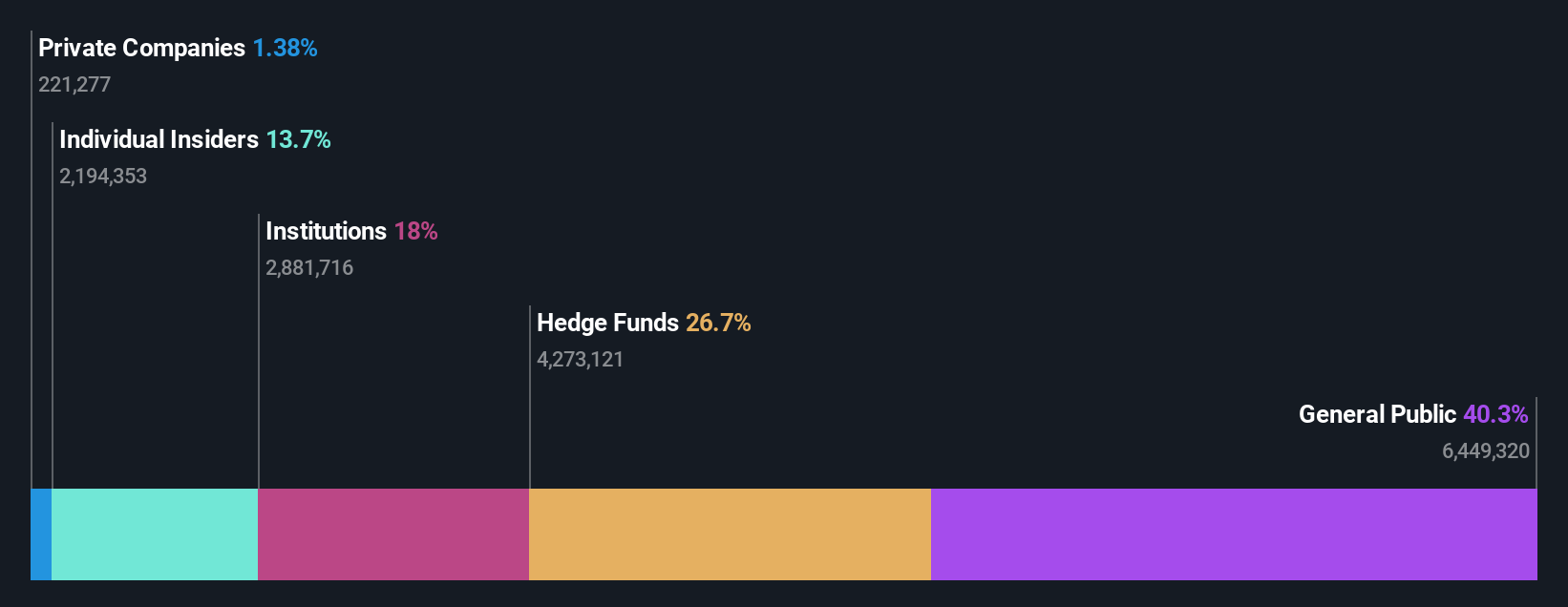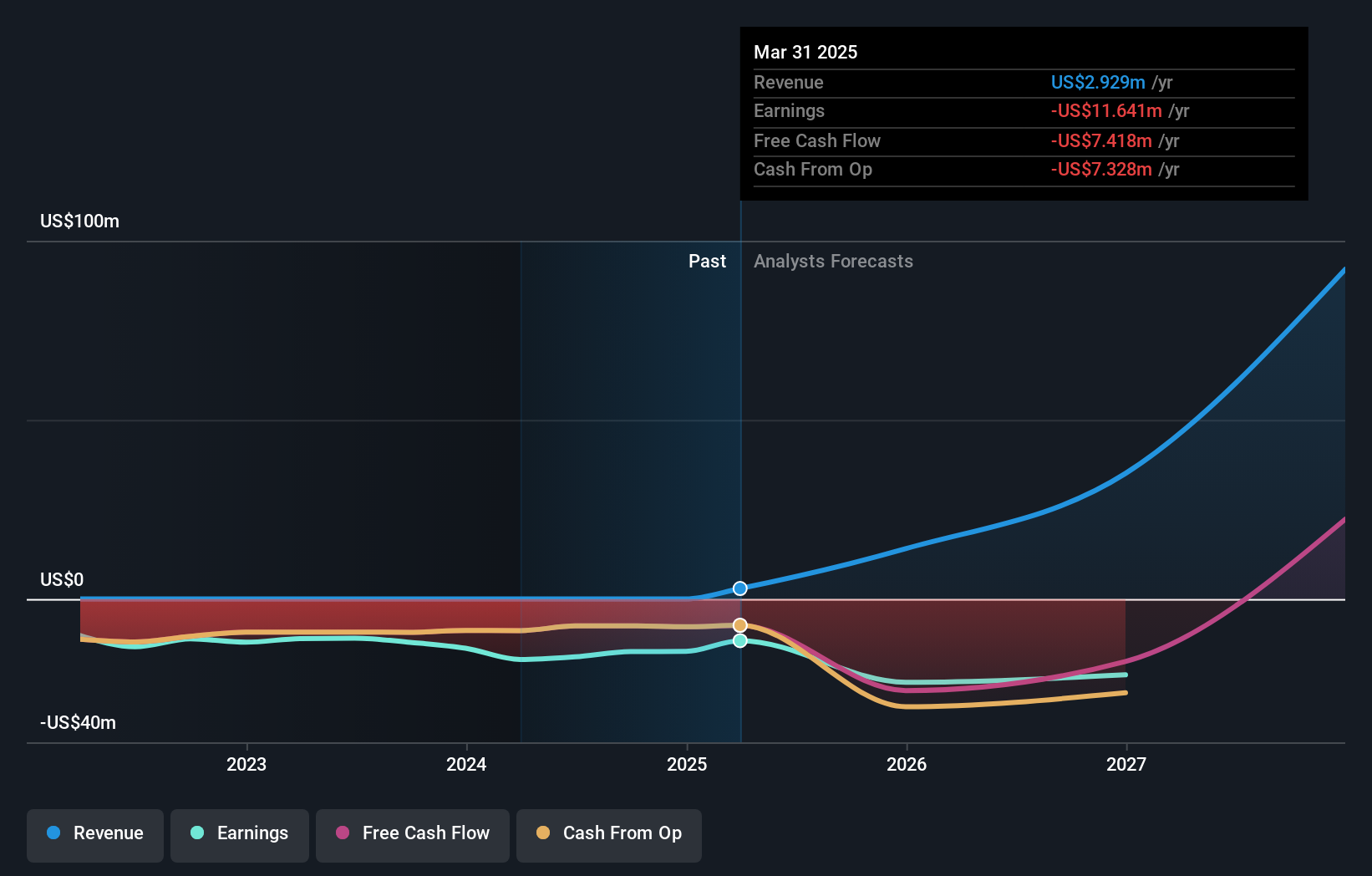Alpha Cognition Inc.'s (NASDAQ:ACOG) market cap surged US$24m last week, retail investors who have a lot riding on the company were rewarded
Key Insights
- Significant control over Alpha Cognition by retail investors implies that the general public has more power to influence management and governance-related decisions
- The top 15 shareholders own 51% of the company
- Insider ownership in Alpha Cognition is 14%
We've found 21 US stocks that are forecast to pay a dividend yield of over 6% next year. See the full list for free.
If you want to know who really controls Alpha Cognition Inc. (NASDAQ:ACOG), then you'll have to look at the makeup of its share registry. We can see that retail investors own the lion's share in the company with 40% ownership. That is, the group stands to benefit the most if the stock rises (or lose the most if there is a downturn).
As a result, retail investors were the biggest beneficiaries of last week’s 16% gain.
Let's delve deeper into each type of owner of Alpha Cognition, beginning with the chart below.
See our latest analysis for Alpha Cognition

What Does The Institutional Ownership Tell Us About Alpha Cognition?
Institutions typically measure themselves against a benchmark when reporting to their own investors, so they often become more enthusiastic about a stock once it's included in a major index. We would expect most companies to have some institutions on the register, especially if they are growing.
As you can see, institutional investors have a fair amount of stake in Alpha Cognition. This can indicate that the company has a certain degree of credibility in the investment community. However, it is best to be wary of relying on the supposed validation that comes with institutional investors. They too, get it wrong sometimes. If multiple institutions change their view on a stock at the same time, you could see the share price drop fast. It's therefore worth looking at Alpha Cognition's earnings history below. Of course, the future is what really matters.

It looks like hedge funds own 27% of Alpha Cognition shares. That's interesting, because hedge funds can be quite active and activist. Many look for medium term catalysts that will drive the share price higher. Our data shows that Solas Capital Management, LLC is the largest shareholder with 8.7% of shares outstanding. With 6.5% and 6.0% of the shares outstanding respectively, AWM Investment Company Inc and Ikarian Capital, LLC are the second and third largest shareholders.
After doing some more digging, we found that the top 15 have the combined ownership of 51% in the company, suggesting that no single shareholder has significant control over the company.
Researching institutional ownership is a good way to gauge and filter a stock's expected performance. The same can be achieved by studying analyst sentiments. There is a little analyst coverage of the stock, but not much. So there is room for it to gain more coverage.
Insider Ownership Of Alpha Cognition
The definition of an insider can differ slightly between different countries, but members of the board of directors always count. The company management answer to the board and the latter should represent the interests of shareholders. Notably, sometimes top-level managers are on the board themselves.
I generally consider insider ownership to be a good thing. However, on some occasions it makes it more difficult for other shareholders to hold the board accountable for decisions.
Our most recent data indicates that insiders own a reasonable proportion of Alpha Cognition Inc.. Insiders have a US$25m stake in this US$180m business. It is great to see insiders so invested in the business. It might be worth checking if those insiders have been buying recently.
General Public Ownership
The general public-- including retail investors -- own 40% stake in the company, and hence can't easily be ignored. While this size of ownership may not be enough to sway a policy decision in their favour, they can still make a collective impact on company policies.
Next Steps:
It's always worth thinking about the different groups who own shares in a company. But to understand Alpha Cognition better, we need to consider many other factors. For example, we've discovered 5 warning signs for Alpha Cognition (2 are potentially serious!) that you should be aware of before investing here.
Ultimately the future is most important. You can access this free report on analyst forecasts for the company.
NB: Figures in this article are calculated using data from the last twelve months, which refer to the 12-month period ending on the last date of the month the financial statement is dated. This may not be consistent with full year annual report figures.
New: Manage All Your Stock Portfolios in One Place
We've created the ultimate portfolio companion for stock investors, and it's free.
• Connect an unlimited number of Portfolios and see your total in one currency• Be alerted to new Warning Signs or Risks via email or mobile• Track the Fair Value of your stocks
Try a Demo Portfolio for FreeHave feedback on this article? Concerned about the content? Get in touch with us directly. Alternatively, email editorial-team (at) simplywallst.com.This article by Simply Wall St is general in nature. We provide commentary based on historical data and analyst forecasts only using an unbiased methodology and our articles are not intended to be financial advice. It does not constitute a recommendation to buy or sell any stock, and does not take account of your objectives, or your financial situation. We aim to bring you long-term focused analysis driven by fundamental data. Note that our analysis may not factor in the latest price-sensitive company announcements or qualitative material. Simply Wall St has no position in any stocks mentioned.
免责声明:投资有风险,本文并非投资建议,以上内容不应被视为任何金融产品的购买或出售要约、建议或邀请,作者或其他用户的任何相关讨论、评论或帖子也不应被视为此类内容。本文仅供一般参考,不考虑您的个人投资目标、财务状况或需求。TTM对信息的准确性和完整性不承担任何责任或保证,投资者应自行研究并在投资前寻求专业建议。
热议股票
- 1
- 2
- 3
- 4
- 5
- 6
- 7
- 8
- 9
- 10